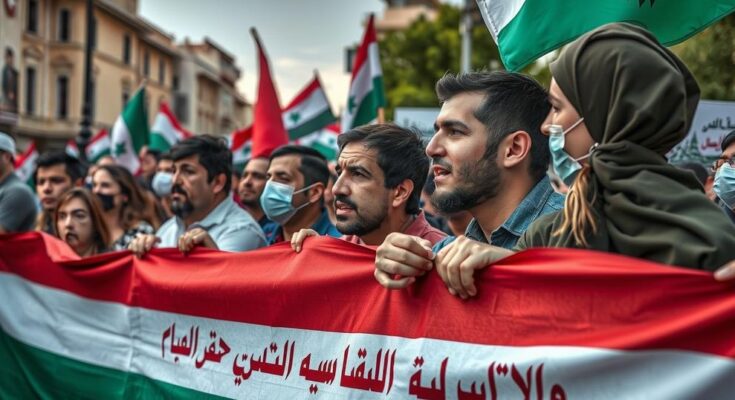Hundreds protested in Tripoli, Lebanon, demanding the release of Islamist detainees linked to the Syrian civil war. The individuals, who had fought against Assad’s regime, were arrested upon returning to Lebanon. The demonstrations aim to exert pressure on authorities for the prisoners’ freedom, highlighting the need for fair trials amid ongoing sectarian tensions in the region.
On Sunday, a significant protest took place in Tripoli, Lebanon, where hundreds demanded the release of Islamist prisoners detained due to their involvement in the Syrian civil war. These individuals are primarily Lebanese citizens who had traveled to Syria to support opposition forces, including jihadist groups, against President Bashar al-Assad’s regime since the conflict erupted in 2011. The demonstration, held in Nour Square, followed the recent fall of the Assad government, prompting activists like Ahmad al-Shimali to advocate for the detainees’ freedom, emphasizing their fight for the Syrian cause.
Shimali highlighted the plight of those imprisoned, stating, “Islamist detainees in Lebanon’s prisons were arrested in the context of the Syrian revolution.” He further noted that many had either fought on the ground or maintained communication with combatants during the lengthy civil conflict. Human rights activists have long called for legal proceedings for those linked to Islamist extremism, as many remain incarcerated for extended periods without trial. Prime Minister Najib Mikati acknowledged the issue in December, indicating that it requires a decisive resolution, yet a parliamentary consensus on a general amnesty remains essential.
Tripoli, a city marked by sectarian tensions, was embroiled in clashes during the initial stages of the Syrian conflict, particularly between Sunni Muslim neighborhoods and areas predominantly populated by the Alawite sect, a faction to which President Assad belongs. Such historical context underscores the complexities surrounding the protests and the broader implications for Lebanese society as it grapples with the consequences of the Syrian war.
The backdrop of this rally is rooted in the Syrian civil war which began in 2011, ignited by protests against the Assad regime’s authoritarian rule. The conflict has led numerous Lebanese individuals to join rebel forces, believing they were contributing to a just cause. Upon returning to Lebanon, many were arrested due to their affiliations with jihadists or for directly participating in the conflict. This context highlights the ongoing tensions in Lebanese society and the ramifications of the regional crisis, reflecting the discord between various sectarian groups.
The Tripoli protest epitomizes the ongoing struggle for justice and recognition of those involved in the Syrian conflict from Lebanon. As demonstrators continue to push for the release of Islamist detainees, the government’s response and potential for reform remain critical. Furthermore, the call for fair trials illustrates broader human rights concerns, emphasizing the urgent need for a comprehensive approach to dealing with the remnants of a tumultuous regional conflict that has deeply impacted Lebanon.
Original Source: www.al-monitor.com




